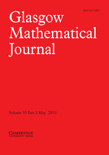
GLASGOW MATHEMATICAL JOURNAL
Scope & Guideline
Pioneering excellence in mathematical scholarship since 1967.
Introduction
Aims and Scopes
- Algebraic Structures:
Research in this area includes studies on rings, algebras, and their representations, emphasizing the relationships between algebraic objects and their applications in various mathematical contexts. - Geometry and Topology:
The journal publishes works exploring geometric structures, topological properties, and the interplay between geometry and algebra, including studies on manifolds, surfaces, and geometric group theory. - Homological Algebra and Category Theory:
Papers focusing on homological methods and categorical approaches are prevalent, addressing topics such as derived categories, abelian categories, and their applications in algebraic geometry and representation theory. - Group Theory and Representation Theory:
The journal features significant contributions to group theory, including studies on finite groups, Lie groups, and their representations, often with implications for geometry and topology. - Mathematical Physics:
Research intersecting mathematics and physics, especially in areas like quantum theory and statistical mechanics, is an essential part of the journal, providing insights into mathematical formulations of physical theories.
Trending and Emerging
- Higher-Dimensional Algebra:
There is a noticeable increase in research related to higher-dimensional algebra, including topics such as higher categories and derived algebraic geometry, indicating a growing interest in abstract algebraic structures. - Noncommutative Geometry:
Emerging works in noncommutative geometry and its applications suggest a rising trend, reflecting the field's expanding relevance in mathematics and theoretical physics. - Homotopy Theory and Topological Methods:
Recent papers indicate a shift towards homotopy theory and topological methods, particularly in the context of algebraic topology, suggesting a renewed interest in the intersection of topology and algebra. - Quantum Algebra and Applications:
The integration of quantum algebra into mathematical research is on the rise, with applications to representation theory and mathematical physics, showcasing the interplay between algebra and quantum theory. - Mathematical Aspects of Machine Learning:
An emerging focus on the mathematical foundations of machine learning and data science is evident, as researchers explore theoretical frameworks and algorithms, indicating the journal's adaptation to contemporary applications of mathematics.
Declining or Waning
- Classical Analysis:
While foundational analysis remains important, there appears to be a waning focus on classical topics such as real and complex analysis, possibly due to the increasing integration of analysis with other areas like topology and algebra. - Elementary Number Theory:
Research specifically targeting elementary techniques in number theory seems less frequent, as more advanced and abstract approaches are favored, possibly reflecting a broader trend towards algebraic and geometric methods. - Combinatorial Geometry:
Although combinatorial aspects of geometry have historically been a topic of interest, recent publications suggest a decreased emphasis on purely combinatorial methods, shifting towards more algebraic or topological perspectives.
Similar Journals
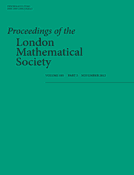
PROCEEDINGS OF THE LONDON MATHEMATICAL SOCIETY
Exploring the Depths of Mathematical ResearchPROCEEDINGS OF THE LONDON MATHEMATICAL SOCIETY, published by WILEY, is a prestigious journal in the field of mathematics, specifically recognized for its contributions to various branches of mathematical research. With a heritage dating back to 1865, this journal has consistently provided a platform for high-quality research, maintaining a notable Q1 ranking in miscellaneous mathematics as of 2023 and achieving a commendable ranking of #67 out of 399 in general mathematics on Scopus, placing it in the 83rd percentile. Though the journal does not currently offer open access, it remains a critical resource for mathematicians looking to disseminate their findings and engage with cutting-edge research. Situated in the United Kingdom, the journal's longstanding history and rigorous peer-review process ensure that it supports innovative and significant mathematical advancements, making it an essential read for researchers, professionals, and students alike.

Korean Journal of Mathematics
Pioneering Research for Tomorrow's Mathematicians.The Korean Journal of Mathematics, published by the Kangwon-Kyungki Mathematical Society, is an esteemed platform dedicated to advancing the field of mathematics. With an ISSN of 1976-8605 and E-ISSN of 2288-1433, the journal features a range of scholarly articles that emphasize both theoretical and applied aspects of mathematics, catering to researchers, professionals, and students alike. Although it is not open access, the journal maintains a commitment to academic rigor and integrity, ensuring high-quality contributions to the mathematical community. As it converges from years 2021 to 2024, the Korean Journal of Mathematics is poised to enhance its visibility within the Scopus database, currently ranking #354 out of 399 in the general mathematics category, reflecting its potential for growth and impact in the mathematical sciences. With its strategic focus and institutional backing from Kangwon National University, the journal serves as a vital resource for fostering research and dialogue in the ever-evolving landscape of mathematics.
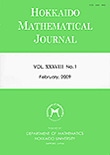
Hokkaido Mathematical Journal
Exploring the depths of mathematics for a brighter future.Hokkaido Mathematical Journal, published by Hokkaido University, Department of Mathematics, stands as a pivotal platform for scholarly discourse in the field of mathematics. Established in 1972, this peer-reviewed journal has consistently contributed to the advancement of mathematical research, covering a wide spectrum of topics within the discipline. With its current ranking in the third quartile (Q3) among miscellaneous mathematics journals, it offers valuable insights and findings that cater to both established researchers and budding mathematicians alike. The journal is accessible through traditional subscription, fostering a community that values rigorous theoretical exploration and applied mathematical methods. As it approaches its convergence year in 2024, Hokkaido Mathematical Journal remains essential for those dedicated to pushing the boundaries of mathematical knowledge and innovation in Japan and beyond.

Milan Journal of Mathematics
Advancing mathematical frontiers with precision.Milan Journal of Mathematics is a prestigious academic publication dedicated to advancing the field of mathematics, particularly in the miscellaneous areas of the discipline. Published by SPRINGER BASEL AG in Switzerland, this journal has established a strong impact in the academic community, noted for its Q1 ranking in Mathematics and achieving a commendable 80th percentile in the Scopus rankings. With an ISSN of 1424-9286 and E-ISSN 1424-9294, the journal serves as a crucial platform for researchers and scholars to disseminate their findings and engage with cutting-edge mathematical theories and applications. Although not an Open Access publication, it provides valuable insights and rigorous academic discourse for professionals, researchers, and students alike, fostering a rich environment for knowledge exchange and innovation in mathematics.
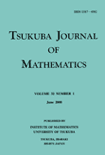
Tsukuba Journal of Mathematics
Exploring New Dimensions of Mathematical ThoughtTsukuba Journal of Mathematics is a distinguished publication dedicated to advancing the field of mathematics through the dissemination of innovative research and comprehensive studies. Published by the University of Tsukuba, Department of Mathematics, this journal serves as a vital platform for mathematicians, researchers, and students to engage with cutting-edge mathematical theories and methodologies. Although currently not available as an open-access journal, it maintains a strong academic presence, contributing significantly to the global mathematical landscape. The journal invites submissions across various branches of mathematics, aiming to foster scholarly communication and collaboration. The ISSN 0387-4982 and the E-ISSN 2423-821X further establish its credibility and accessibility among the academic community, supporting its critical objective of facilitating high-quality research output. Situated in Tsukuba, Japan, a hub for scientific research and development, the Tsukuba Journal of Mathematics is committed to bridging gaps in mathematical knowledge and encouraging exploration of novel ideas.
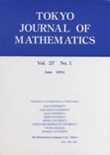
Tokyo Journal of Mathematics
Bridging Cultures Through the Language of MathematicsTokyo Journal of Mathematics is a prestigious journal dedicated to the dissemination of high-quality research in the field of mathematics. Founded in 1978, this journal serves as a platform for researchers to publish their findings, providing cutting-edge insights into various mathematical theories and applications. Published by the TOKYO JOURNAL MATHEMATICS EDITORIAL OFFICE ACAD CENTER, the journal is based in Japan and forms an integral part of the global mathematical community. Although listed in the Q4 quartile of Mathematics (Miscellaneous) category for 2023, its inclusion in Scopus rankings highlights its ongoing commitment to scholarly excellence. The journal does not currently offer Open Access options, thus providing readers with insightful access to critical advancements in mathematics. With an ISSN of 0387-3870 and a publication history spanning over four decades, the Tokyo Journal of Mathematics remains an essential resource for researchers, professionals, and students alike, fostering the advancement of mathematical knowledge and collaboration across borders.

MICHIGAN MATHEMATICAL JOURNAL
Elevating Scholarship through Innovative Mathematical DiscoveriesThe MICHIGAN MATHEMATICAL JOURNAL is a prestigious and influential publication in the field of mathematics, founded by the University of Michigan. With an ISSN of 0026-2285 and an E-ISSN of 1945-2365, this journal is recognized for its high-quality research and has achieved a commendable Q1 ranking in the category of Mathematics (miscellaneous) as of 2023. Published by the esteemed Michigan Mathematical Journal, it provides a platform for the dissemination of innovative mathematical theories and findings, playing a crucial role in advancing knowledge and scholarship within the mathematical community. With coverage spanning from 1996 to 2024, the journal emphasizes rigorous theoretical development and fosters collaboration among researchers, professionals, and students alike. While not an open-access journal, its contributions are invaluable for those looking to stay abreast of cutting-edge mathematical research.
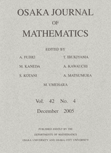
OSAKA JOURNAL OF MATHEMATICS
Exploring New Dimensions of Mathematical KnowledgeOSAKA JOURNAL OF MATHEMATICS, established in 1949 and published from Japan, stands as a reputable platform dedicated to advancing the field of mathematics. With an ISSN of 0030-6126, this journal showcases research in various mathematical disciplines, contributing significantly to both theoretical and applied mathematics. Though it currently holds a Q3 designation in the miscellaneous mathematics category, the journal aims to enhance its impact and visibility within the academic community. Researchers can benefit from the latest insights and findings, making it an essential read for anyone involved in mathematical studies. The journal emphasizes quality over quantity, providing a selective peer-reviewed process that ensures rigorous academic standards. Furthermore, while it is not an open-access journal, it maintains a commitment to disseminating valuable mathematical knowledge across the globe, serving the scholarly community through traditional subscription-based access. OSAKA JOURNAL OF MATHEMATICS is an invaluable resource for professionals, researchers, and students seeking to stay at the forefront of mathematical research and discussions.

Moscow Mathematical Journal
Exploring the Frontiers of Mathematical Knowledge.The Moscow Mathematical Journal, an esteemed publication of the Independent University of Moscow, serves as a pivotal forum for researchers and practitioners in the field of mathematics. Established to foster scholarly discourse and disseminate groundbreaking research, this journal features a wide array of topics within the discipline, currently ranked in the Q1 category of Mathematics (miscellaneous) according to the 2023 evaluations. With its ISSN 1609-3321 and E-ISSN 1609-4514, the journal remains committed to high standards of academic excellence while contributing to the global mathematical community. Despite not being open access, the Moscow Mathematical Journal ensures that its articles are rigorously peer-reviewed, maintaining a robust reputation among mathematicians worldwide. By publishing relevant and innovative research from 2010 to 2024, it exemplifies the rich academic tradition of mathematical inquiry in Russia, promising to engage and inspire upcoming scholars and seasoned professionals alike.

Forum of Mathematics Sigma
Exploring the depths of mathematical excellence.Forum of Mathematics Sigma is a premier open access journal published by Cambridge University Press that has been at the forefront of mathematical research since its inception in 2013. With a strong emphasis on advancing the fields of mathematics, the journal consistently achieves Q1 rankings across multiple categories, including Algebra and Number Theory, Analysis, and Computational Mathematics. This distinction highlights its impact and relevance within the scholarly community. The journal prides itself on providing a platform for innovative research, fostering collaboration among researchers and practitioners across various mathematical disciplines. Open access publication ensures that cutting-edge findings are widely available to readers globally, enhancing the dissemination of knowledge. With an address in the heart of Cambridge, England, Forum of Mathematics Sigma is dedicated to promoting high-quality research and making significant contributions to the development of mathematics.